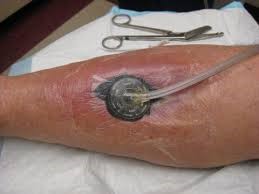Responding to an Online Medical Practice Review: A Case Review
September 23, 2015
By Robert Striks, Special Writer, Encompass HealthCare & Wound Medicine
I know, I know. You can get more bees with honey than vinegar. If you don’t have anything nice to say, don’t say it. If you want to be happy, give up your need to be right.
But all those adages were created before the Internet. In those good old days, if you were an unsatisfied patient, you either confronted the doctor or the staff personally, or you switched doctors.
Not today. Today, you can go online and let the whole world know about your bad experience with a physician and it doesn’t matter in the slightest whether you’re right or wrong. You can sully a wonderful physician’s reputation in the new age’s greatest passive-aggressive vehicle ever created.
Protecting Your Wound Care Practice's Reputation Online
Case in point. A middle-aged daughter (MAD) brings her dear, aged dad (DAD) to our outpatient wound care facility because he has another diabetic foot ulcer. We had dealt with the daughter’s propensity to control every aspect of her father’s care in the past so we knew there would be challenges in implementing his treatment plan.
Dr. Bruce Ruben prescribed a round of IV antibiotics for DAD along with hyperbaric oxygen therapy and intensive wound care. Because of the severity of the wounds and the infection accompanying them, DAD’s treatment plan would take several weeks, if not months, to complete.
One day, MAD decides that the IV antibiotics are not working and she wants to limit the treatment plan to just hyperbaric oxygen therapy. So unlike Dr. Ruben, who holds board certifications in internal medicine, infectious disease and undersea and hyperbaric medicine, plus 25 years of successful practice, MAD, who has no formal medical training, is going to quarterback this one.
This was not going to happen.
That sound you just heard was every physician in the world standing up and applauding.
Here’s why MAD wasn’t going to compromise DAD’s care, and it’s not because the doctor was right and she’s wrong. MAD doesn’t get to call the shots because lives and limbs are at stake.
That’s a line in the sand with patient care that can’t and won’t be ignored no matter how dark it gets and no matter what an angry relative says about the practice online. There’s a reason why Dr. Ruben's practice, Encompass HealthCare & Wound Medicine, has a 99.99% wound cure rate. Encompass HealthCare patients follow their treatment plans in their entirety or:
- Their wounds don’t heal completely, or
- Their conditions worsen, or
- They leave the practice.
It’s just that simple. If you stay in the practice and follow your treatment plan as prescribed, there is a 99.99% probability that your wounds will heal completely.
MAD chose to remove her father from our practice because we would not allow her to choose only hyperbaric oxygen therapy for her father, as if a health care center were a restaurant with an a la carte menu. We don’t practice wound care like that.
It happens. Patients leave practices. What’s not okay, in this scenario, is for the patient’s relative to stand up in the middle of the Internet and disparage a medical practice for maintaining a very high standard of care simply because of issues of control in the family dynamic.
Your Reply: Examples of Responses to Negative Online Reviews
Approaching your response to an online review of your practice takes reflection and tact. Once you get over the initial emotions surrounding a negative online review, what then? Here are just a couple of directions you can take with your reply. You should always take extra time to craft your response so it reflects your core values and authenticity.
If the negative review highlights a real problem with the practice, your response must accept responsibility and offer a plan to resolve the issue:
Dear Patient,
Thank you for bringing this serious issue to my attention. I apologize wholeheartedly for the way you were treated during your visit. It was completely unacceptable and I will resolve this problem without delay.
I train and expect all of my assistants to honor and respect every patient. So if you were not treated with the utmost dignity and compassion during your visit, then we need further training. I will contact you within the next week to tell you how I addressed your issue and what I’ve implemented to make sure this issue never arises again.
Again, thank you for letting me know about your visit and for allowing me to strengthen our important doctor-patient relationship.
Best Regards,
Dr. Contrite
REASONING: A valid complaint by a patient represents a break in the integrity between the doctor and the patient, and between the patient and practice. Re-establishing integrity begins with accepting responsibility for the breaks unconditionally. That means there is no mention of anything said rudely or in anger by the patient and no blame is placed directly on any single associate. This is only about you, the physician, taking responsibility for your part in the conflict.
Notice that the physician has described how the situation should have presented, with every patient being treated with honor and respect. This lets the patient know that there are positive established guidelines that are meant to be followed. It also allows the physician to communicate part of the practice’s mission statement: to treat every patient with the utmost dignity and compassion.
Finally, the response offers a path to a complete resolution of the issue while positioning the physician and practice as concerned, engaged and proactive.
If it is determined that the negative review is unjustified, your response must still accept responsibility and restore the loss of integrity, but the overall objective is to highlight the practice’s mission statement:
Dear Patient,
Thank you for bringing this serious issue to my attention. I am so sorry you feel you were not treated properly during your recent visit. I will be addressing this incident immediately with my staff.
In our practice, we teach our caregivers to treat every patient as if they are a member of our immediate family – with the utmost dignity and compassion. The doctor-patient and patient-office staff relationships are extremely important to us. I believe they are the foundation for achieving the healthiest patient outcomes.
Thank you again for bringing this to my attention. I look forward to offering you a much-improved experience at your next appointment.
Sincerely,
Dr. Understanding
REASONING: Even when you know for certain that you and your staff provided the best care and office experience to your dissatisfied patient, you must still express sorrow about their negative experience. Saying you’re sorry is not the same as apologizing. Being sorry simply means you sympathize with the patient and you regret that there was an issue. No blame is being assigned. You communicate that there will be an investigation and the result will be a more positive experience during the next appointment.
After expressing your sorrow and your intention to resolve any issues with your staff, you have the opportunity to further communicate something positive and unique about your practice, in this case, the importance you place on the doctor-patient relationship. That relationship is sacred and acknowledging it is universally appealing. So while you probably can’t erase the negative review altogether, you can certainly lessen its impact and improve the reader’s perception of your practice.
Our Response to MAD
In the patient case presented earlier, as a member of the Patient Services team, I replied to this particular online comment regarding DAD’s care with the best interest of the patient and caregiver in mind. I used the experience as an opportunity to communicate what we do at Encompass HealthCare. That’s the proverbial lemonade. And if people read these remarks online, I hope they’ll also read my reply and understand what really happened between the family caregiver, Dr. Ruben and her father.
Responding to a negative online review about your practice takes careful consideration of the situation and all of the individuals involved in the patient's care. The goals of a response should be to address the concerns of the patient and/or caregiver based on their experience and communicate your understanding and resolve to address the issue. Take this opportunity to educate the reviewer about the core values and standards of your wound care practice. And maybe someday, it will be understood by all that in music terms, wound healing is full orchestration, not the work of a soloist.
About the Author
Robert Striks is the Director of Marketing at Encompass HealthCare & Wound Medicine. His role at the outpatient wound care facility includes disseminating information, some patient services and growing its online presence.
Dr. Bruce Ruben is the Founder and Medical Director of Encompass HealthCare, located in West Bloomfield, Michigan. Encompass Healthcare is an outpatient facility featuring advanced wound care, IV antibiotic therapies, hyperbaric oxygen treatment, nutritional assessment, and other treatment modalities. Dr. Ruben is board certified in Internal Medicine, Infectious Disease, and in Undersea and Hyperbaric Medicine. He is a member of the Medical and Scientific Advisory Committee and National Spinal Cord Injury Association (NSCIA) board.
The views and opinions expressed in this blog are solely those of the author, and do not represent the views of WoundSource, HMP Global, its affiliates, or subsidiary companies.












Follow WoundSource
Tweets by WoundSource